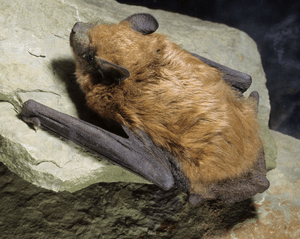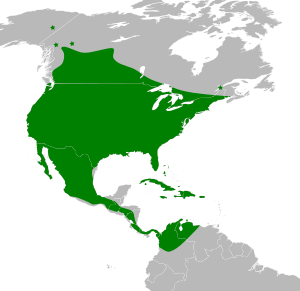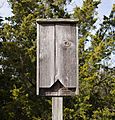Big brown bat facts for kids
Quick facts for kids Big brown bat |
|
|---|---|
 |
|
| A big brown bat on a rock | |
| Conservation status | |
| Scientific classification | |
| Genus: |
Eptesicus
|
| Species: |
fuscus
|
 |
|
| Range map | |
| Synonyms | |
|
|
The big brown bat (Eptesicus fuscus) is a common type of bat. It belongs to a family called "vesper bats." You can find these bats in North America, the Caribbean, and the northern part of South America. A big brown bat usually weighs about 15–26 grams (0.53–0.92 ounces). That's about as much as a few quarters! Its wingspan, which is how wide its wings are when spread out, is about 32.5–35 centimeters (12.8–13.8 inches).
Contents
What Does a Big Brown Bat Look Like?
This bat is a fairly large microbat. Microbats are small bats that use sound to find their way around. The big brown bat weighs between 15 and 26 grams. It is about 110–130 millimeters (4.3–5.1 inches) long. Its wingspan is 32.5–35 centimeters.
Its fur on its back is a reddish-brown color. The fur on its belly is a bit lighter brown. Its snout (nose area), the skin between its legs (called the uropatagium), and its wings are black. These parts do not have any hair. Its ears are also black and quite short.
Where Do Big Brown Bats Live?
Big brown bats live in many places. You can find them from southern Canada and Alaska. They live as far south as Colombia and Venezuela. They have also been seen in the Caribbean. This includes islands like Cuba, Hispaniola, Dominica, Barbados, and the Bahamas.
These bats can live in many different environments. They are found in cities, suburban areas, and countryside areas. They can live from 300 meters (980 feet) to 3,100 meters (10,170 feet) above sea level. This shows they are very good at adapting to different places!
What Do Big Brown Bats Eat?
Big brown bats are insectivores. This means they mostly eat insects. They are very helpful because they eat many kinds of bugs. Their diet includes beetles, flies, stone flies, and mayflies. They also eat true bugs, net-winged insects, and scorpionflies. Other snacks include caddisflies and even cockroaches. They are like tiny pest controllers!
How Do Big Brown Bats Behave?
The big brown bat is a nocturnal animal. This means it is active at night. During the day, it rests in safe, sheltered spots. These resting places are called "roosts." They can roost in many different places. This includes old mines, caves, and tunnels. They also use buildings, bat boxes, and tree holes. Sometimes they hide in storm drains, wood piles, or cracks in rocks.
In the summer, male bats usually live alone. Sometimes, they might form small groups. These groups are only made up of other male bats.
How Do Big Brown Bats Have Babies?
Big brown bats usually mate in the fall. After the mating season, pregnant female bats gather together. They form special groups called maternity colonies. These colonies start forming around April. A maternity colony can have anywhere from 5 to 700 bats!
When baby bats are born, they are called pups. These pups are blind and cannot do much by themselves. A newborn pup weighs about 3 grams (0.11 ounces). The pup drinks milk from its mother for about one month. Baby bats start flying when they are about three to five weeks old.
Images for kids
-
A big brown bat, eating a mealworm.
See also
 In Spanish: Murciélago moreno para niños
In Spanish: Murciélago moreno para niños







